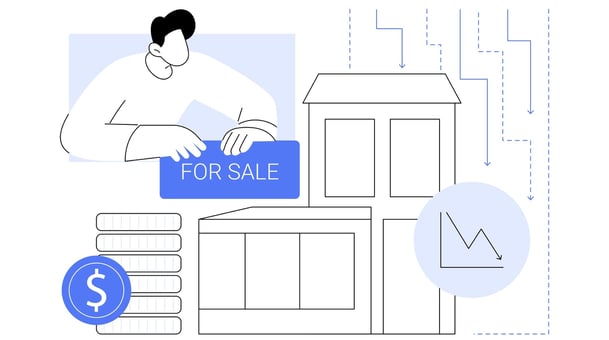How One Real Estate Educator’s Journey Through The Uncomfortable Allowed Her To Grow A Passionate Community For Good

“If I’d listened to everyone back when we told our parents we were leaving our corporate jobs…we would not be where we’re at today.”
Heather J Keller’s kind determination and grassroots optimism shine through in her recollection of the early days of her real estate career, reverberating off the reality that to gain the success she’s seen in recent years – she needed to take those big, necessary risks that others weren’t as onboard for.

“Everyone told us we were crazy.”
To be fair – they were.
And that’s what makes Keller’s success story one for the record books.
Now a thriving CEO guiding a passionate community of agents across the country, Keller's start was anything but predictable.
As a mortgage banker in Chicago in the midst of the housing market crash of the 2000s, Keller took the opportunity to sink into the uncomfortable and grow from it.
And she had to. With nearly 10 million Americans displaced and staggering rates of unemployment continuing to climb, foreclosures were up over 80% in 2008 – a steep 225% increase from 2006 when Keller first touched down in the Windy City.
“When things started to tank, we couldn’t lend mortgages anymore,” she notes. “It was crazy. It was like almost overnight where…we couldn’t even give mortgages.”
Trapped in an industry in dire disrepair, Keller had to pivot.

And in the ever-shifting world of property business, we know trying new things is the fundamental ticket to entry and often a necessity just to survive.
Now tapping into the expansive power of public records data to save families on the brink of losing it all, Keller's path is a valuable how-to in leveraging grit, innovation, and progressive property tools to reach the finish line.
“So my biggest advice…is to follow your heart and not listen to what everyone else is saying.”
Change is scary. Venturing into new territory – also scary. Risking it all? Terrifying.
Getting uncomfortable in order to grow? Oftentimes, absolutely required.
Taking Serious Risks To Pave The Way For Serious Growth
“I’m from like a small town in Michigan, and I was 23 years old…I knew no one,” explains Keller. “And I moved to the city.”
“I was scared to death!”
When Keller initially packed her bags and headed to Chicago, she was in an MBA and law program, studying to become an attorney. However, with years in the classroom looming ahead of her, she began to rethink if that was the right path for her.
“Real estate was kind of always on my radar,” she notes. “My grandfather – who I was very close with – he was an entrepreneur, started a pretty successful company in Michigan. And then, after he retired, he became a realtor.”
So Keller shifted course and launched herself forward.
“I had to make myself feel uncomfortable. And I always encourage people to do that,” she explains. “You can’t let fear…control you.”
And to put it lightly – there was a whole lot of fear in the housing market at that time.
A Turbulent Market And An Unsure Future
An economic downturn so significant it was dubbed The Great Recession; America hadn’t seen times this bad since the 1930s. Domestic product was down over 4%, and the S&P 500 saw a drop of 57%.
Naturally, this hit the housing market. Hard.

We can trace early origins of the problem back to the Dotcom bubble implosion, which followed the aftermath of high investment periods for tech-centric companies in the late 1990s.
Web browsers were the newest shiny object in the internet game, and investors were eager to empty their wallets and jump on board.
Pair that with low interest rates and the lowering of capital gains tax to sway even more to finance the cutting-edge tech that would popularize home computers and lead to successful IPOs like Amazon, Intuit, Yahoo, and eBay.
Tech was king. Until it wasn’t.
The bubble crashed in 2000, following the Nasdaq peak on March 10th.
The hellish mix of rising interest rates, the devaluation of tech stocks, and the high number of tech start-ups failing was simply not a winning combination for a continued joyride of the economy.
With the attacks of September 11th, 2001, the economy worsened.
In subsequent years, more credit and the introduction of subprime mortgages, which saw more flexible criteria for borrowers, created an unfortunate storm that led to a mass wave of foreclosures across the country.

Keller’s job as a mortgage banker had shifted. So she switched gears.
Being at the forefront of the boom, she noticed opportunity in one particular aspect of the market that could help families on the brink of losing it all.
And that’s what she did.
The Rising Need For Short Sales...And Educating Agents To Do It Right
“Growing up…I wanted to do something that made some sort of difference.”
Noting she always had “a really big heart,” Keller shifted into short sales, quitting her job alongside her husband – whom she’d met in the mortgage space – and was able to do just that.
“It is very, very rewarding,” she notes. “In the end…we can tell that family – ‘hey, we’re done, and you are going to avoid foreclosure.’”
“I’m holding their hand on to the next chapter of their lives.”
In simple terms, a short sale refers to the sale of a property for less than what is owed on the mortgage. A successful short sale helps the homeowner avoid foreclosure and can be the much preferable fresh start one needs when facing financial hardship.
Now, before you go blaming the homeowners as responsible for potentially defaulting on their payments – consider the time period – a multifaceted sky of hope, bliss, and Gatsby-inspired optimism ready to invite anyone in for a good time – rather than a long time.
And while you’re at it, consider subprime mortgages themselves.
Those struggling to afford homeownership aren’t necessarily a new trend in the U.S.

However, when the housing bubble promised low payments and more options for those previously ineligible? Why wouldn’t they take advantage? And responsibly purchase homes with an amount they had been approved?
When prices rose, many couldn’t afford the steep increases and needed options to escape the mounting debt.
Generally, there are many reasons why a struggling homeowner may opt for – or wish to aggressively pursue – a short sale:
- Impact on credit report. Foreclosures do far more damage to a credit report than a short sale. Bankruptcy debt negatively impacts a credit report for ten years versus the impact of a short sale, which may stick for seven years in a worst-case scenario.
- Their next home purchase. Even if times are tough now, they may not always be, and impacted homeowners could wish to buy again down the road. Having a foreclosure on their record will fare much worse than a short sale in this case. A foreclosure would block the homeowner from a Fannie Mae loan for five years, compared to the two from a short sale.
- Potential debt relief. In certain situations, select lenders may agree to forgive the remaining amount of the mortgage not covered by the short sale and that the homeowner cannot afford to repay. This allows for the homeowner to start fresh and step away from under the heavy cloud of debt.
While short sales could certainly be the saving grace for many suffering from high home prices, overwhelming mortgages – or the subprime mortgages bestowed upon them – it’s still an uphill battle to both qualify and receive a lender’s approval to move forward down this path.
The bottom line? It takes a heck of a lot of knowledge and a whole lot of savvy real estate fighting to take this option across the finish line for a client.

Struggling homeowners need someone who can effectively fight for them and their financial future…and come out on top.
Something that Keller takes particularly seriously.
“I realized very quickly…a lot of agents really don’t truly understand A to Z when it comes to short sales,” she explains. “I’m a firm believer that if an agent has no clue how to handle this type of transaction, they should not be taking it on.”
Fighting – but valid – words from someone who’s seen the tears, heard the gratitude, and quite literally guided agents nationwide in the saving of thousands of families from foreclosure.
All with the techniques, approaches, and rigorously followed lessons she’s held dear since 2007.
“It’s about helping the homeowner move on, and you can’t properly help the homeowner if you’re not educated.
“And so that is why I just started BluePrint Short Sales.”
A Community Of Real Estate Professionals Fighting For Good
Launched by Keller and her husband, BluePrint Short Sales offers agents across the country guidance on how to help homeowners through the turbulent short sale process in their respective markets – as well as provides a community to support and lead them forward on their toughest days.

“I really wish that my husband and I had a community like BluePrint when we first started because I think we would have learned a lot more, a lot quicker,” explains Keller.
Explaining that when the duo first started out in short sales, they had “no clue what we were doing” and that it took forever to close their first home; being able to now turn around and help others in the same position appears to have brought the couple full circle.
“That is another reason why I founded BluePrint Short Sales is because I want agents who are like me and have that passion to help and make a difference to be a part of this community and we can grow together.”
Noting the system she teaches is very simple, Keller emphasizes the importance of her three pillar process – “organization, consistency, and communication".
“I look more for agents who have that heart and that passion…and believe in our mission of helping 10,000 families across the United States avoid foreclosure.”
Keller doesn’t sugarcoat it.
She knows what these families have on the line, and she knows how terrifying a situation it can be for those impacted.
“It is daunting. It is frightening. They’re getting bad information online. It’s scary,” she explains. “I want people, not only in Chicagoland but across the country, to know that there are good people out there that can truly help you through this situation.”
And that help is strongly needed as qualifying for – and successfully completing – a short sale is no easy feat.
Not only must the home value be less than the mortgage owed, but the payments need to be in default – or at risk of default. It must be clear (and often proven) that the homeowner is in financial hardship and that the seller does not have alternate assets to pay back the original lender.
Keep in mind that even after the qualification process, a buyer still needs to make an offer on the property – and the lender still needs to accept this offer – for the short sale to be complete.

For such a difficult process, it’s no wonder why Keller is so passionate that proper education is needed in order to support those struggling homeowners who need it most.
And for the agents within her community, she’s equally dedicated to providing the tools, training, and resources to help them succeed.
One such tool that’s been able to expand her growth engine? PropertyRadar and the power of public records data.
Get More With Public Records. Use PropertyRadar To Do It Best
Tapping into public records information is a fundamental method for surfacing distressed or defaulted properties that may need the assistance of a short sale expert.
Understanding the complex dynamics of equity, underwater owners, and transaction history can assist agents in personalizing their approach and providing the customized assistance these struggling families need.

The downside? Public records data can be messy, extensive to sort through and equate to a lot of lost time keying into the individual property by individual property.
Good thing for Keller, there’s a better solution.
“I really believe in keeping things simple, and so my system is very simple,” Keller explains.
“Our most valuable asset is time,” she adds. “I don’t want to take a ton of time researching all of these properties.”
Enter: PropertyRadar.
A revolutionary resource for data-driven real estate professionals, PropertyRadar allows effortless access to public records data while slashing the needless wait times and inability to see the broader picture.
With PropertyRadar, Keller gets an accessible, cutting-edge interface and the capabilities to pinpoint her search to her hyperlocal community, focusing in quickly on the people and properties that need her most.
From here, she can sort these homes into dynamic, automatically updating lists, so she’s always in the know about residences heading to auction and those in pre-foreclosure status. This allows her to easily adjust her approach, marketing, and strategies to homeowners – a personalization piece that she emphasizes is “super, super important.”
“My biggest thing with PropertyRadar is that it’s very simple to navigate.”
And while Keller may be more focused within the short sale niche, she praises PropertyRadar for its ability to go above and beyond this, noting its multifunctional capabilities to help others with varying focuses within her community.
“We have investor-friendly agents, we have agents that just work with homeowners,” she explains. “You can look up so much different data.”
And even with the magnitude of data available and the multifaceted support PropertyRadar can offer realty professionals of all kinds – it doesn’t lose its simple approach and ease of use.
For Keller – that’s the most vital piece.
Her and her team can then take that time back and focus it on homeowners in need, dedicating their energy and efforts toward helping “them move on to the next chapter.”
“I’m not really the typical realtor,” Keller notes.
No, she’s not.
She’s so much more.
Interested in learning more about how PropertyRadar can help your real estate business grow?
Join Keller and thousands of property-centric professionals leveraging the power of public records and tapping into over 150 million properties nationwide.
Get started now with a free trial and check out PropertyRadar's powerful interface and seamless search capabilities today.



